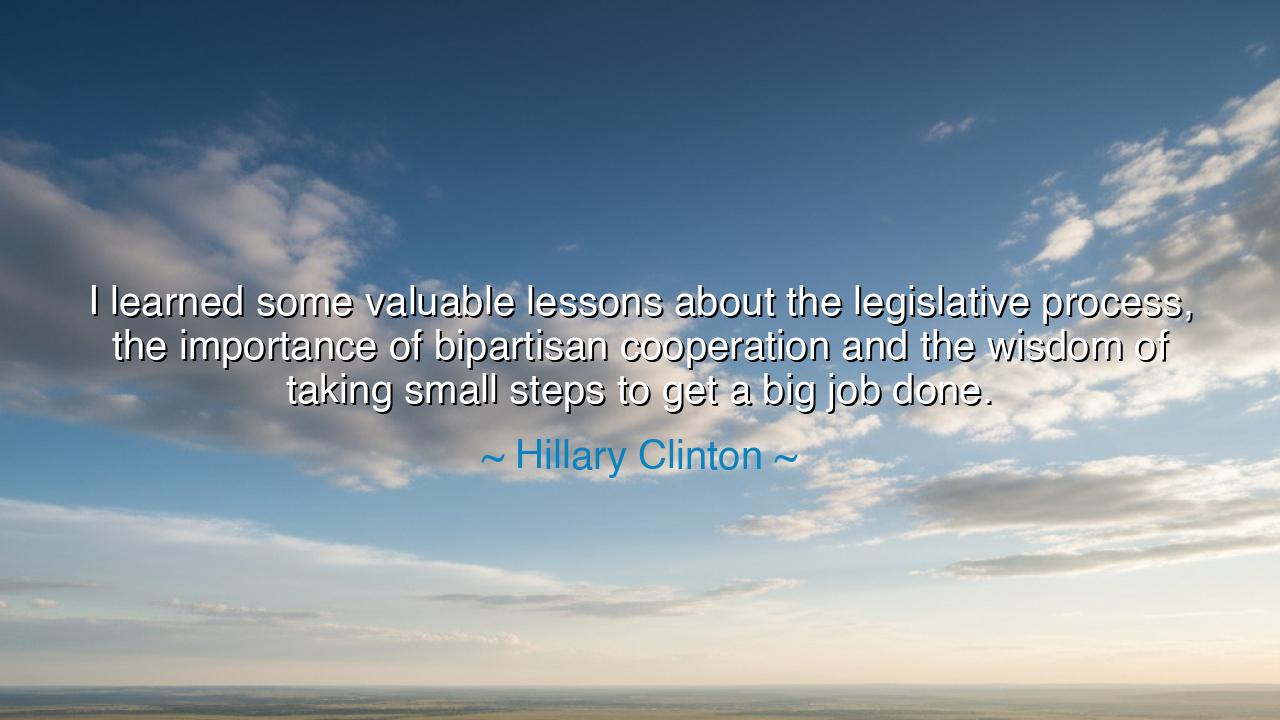
I learned some valuable lessons about the legislative process
I learned some valuable lessons about the legislative process, the importance of bipartisan cooperation and the wisdom of taking small steps to get a big job done.






Hillary Clinton, tempered by years in the forge of public service, speaks with the clarity of experience when she declares: “I learned some valuable lessons about the legislative process, the importance of bipartisan cooperation and the wisdom of taking small steps to get a big job done.” In these words, she unveils not only the nature of politics, but the deeper law of human endeavor: that great undertakings are seldom accomplished by force or speed, but by patience, persistence, and the weaving together of many wills.
The ancients themselves practiced this art. In the Roman Senate, where rival factions often clashed, wise leaders knew that compromise—though less glorious than conquest—was the true path to stability. Cicero, with his oratory, worked tirelessly to balance competing forces, understanding that a republic survives not through domination of one side, but through cooperation across divisions. Clinton’s words echo this ancient wisdom: that progress is secured when adversaries learn to walk together, even if only a step at a time.
History offers a shining example in the work of Abraham Lincoln. He faced a fractured nation and a bitterly divided Congress, yet he moved with caution and strategy. By taking small steps—the Emancipation Proclamation first as a war measure, the push for the Thirteenth Amendment later—he secured the abolition of slavery. Had he demanded all at once without compromise, he might have lost everything. His greatness lay in knowing that the path to immense change was built one stone at a time.
Clinton’s reflection also reminds us that the legislative process itself is not meant to be swift, but deliberate, requiring voices from many sides to shape laws that endure. To work across party lines is not weakness, but strength—for it acknowledges that truth is not the possession of one faction alone. In this humility lies wisdom, for the builder of bridges accomplishes more than the breaker of walls.
Let the generations remember: the grandest monuments are not raised in a single stroke, but by steady labor, brick upon brick. In politics, in life, in all noble endeavors, the key is not in haste, but in persistence, not in pride, but in cooperation. For he who dares to take small steps toward a mighty goal shall find, in time, that he has crossed mountains. And this is the enduring lesson: that patience, unity, and humility are the true companions of wisdom on the path to greatness.






MHNguyen Manh Hung
I feel this quote emphasizes humility and strategic thinking. How do lawmakers determine which steps are the most effective for achieving long-term goals? Is bipartisan cooperation often undervalued in the rush for headline-grabbing achievements? I also wonder whether this approach reduces frustration and burnout in the legislative process by setting realistic expectations. Could the principles of patience, compromise, and incremental progress be applied to personal or professional goals outside of politics as well?
NKNgo kiet
This quote raises questions about the skills necessary for effective lawmaking. How can politicians develop the ability to collaborate across party lines while maintaining their core principles? I’m curious whether small, incremental progress is always preferable, or if certain moments demand bold, decisive action. Could the lessons Clinton describes be taught systematically, or are they only learned through experience? It also makes me wonder how constituents perceive incremental successes versus symbolic victories in legislative work.
TNTu Thanh Noan
I find this statement intriguing because it highlights practical lessons in political strategy. How often do legislators overlook the value of incremental change in pursuit of ambitious goals? I wonder whether the wisdom of small steps applies to contentious or controversial issues differently than to more widely supported initiatives. Additionally, what role does listening and compromise play in fostering genuine bipartisan cooperation? This makes me reflect on whether patience and persistence are as crucial to political success as intelligence or ideology.
NBDuong Kieu nguyen binh
Reading this, I feel inspired by the emphasis on learning from experience. How can lawmakers balance the urgency of public demand with the slow, deliberate process required to pass legislation? Does Clinton suggest that wisdom comes not only from victories but also from navigating setbacks and negotiating compromises? I’m also interested in how fostering bipartisan cooperation affects long-term policy sustainability. Could this philosophy help bridge partisan divides in today’s highly polarized political environment?
TLLy thanh luc
This quote makes me think about the challenges of governance and the value of patience in politics. I wonder how often politicians underestimate the importance of incremental progress and bipartisan collaboration. Could focusing on small, achievable steps be a more effective strategy for complex legislative work than trying to push for sweeping reforms all at once? I’m also curious how these lessons might apply beyond politics, in organizational management or community projects where cooperation and careful planning are essential.